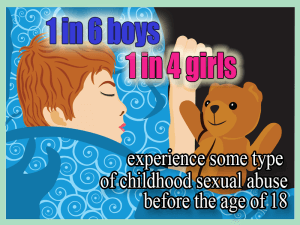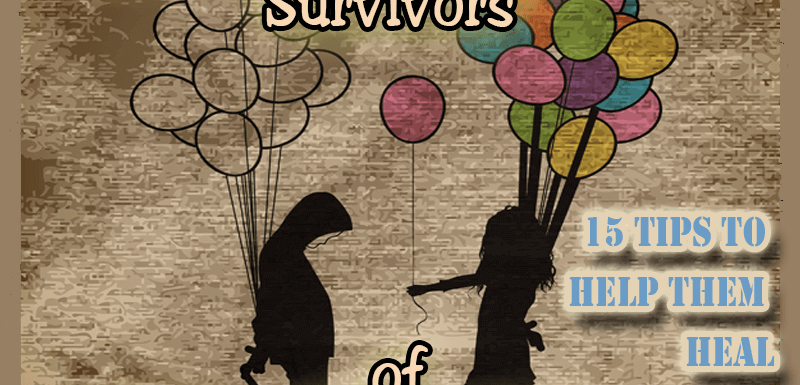How can we be helpful to the survivors of childhood sexual abuse? How can we show love and support to the survivors when the news breaks- and how can we continue to show support over the months and years ahead?
 Everyone wants to be vocal and show support when the news initially breaks. Sometimes that support comes by sharing news posts via social media and even by commenting on those posts with comments about the perpetrator. Other times that support comes with phone calls, casseroles, prayers, and being outside waiting after the survivor is questioned by social services, police detectives, attorneys, and judges.
Everyone wants to be vocal and show support when the news initially breaks. Sometimes that support comes by sharing news posts via social media and even by commenting on those posts with comments about the perpetrator. Other times that support comes with phone calls, casseroles, prayers, and being outside waiting after the survivor is questioned by social services, police detectives, attorneys, and judges.
Being helpful and supportive to survivors is such much more complicated than that. For instance, you may be more than willing to sit and listen to them cry and pour out their heart, but did you know that some comments made on social media can prevent that conversation from even happening with you?
A comment saying, “They deserve to die,” may in fact be merited in some situations and be meant as a way to show support. But for someone who was abused by a grandfather beloved by many family members, it’s not going to be that clear cut to the survivors.
Some survivors may agree wholeheartedly with the “off with their head” notion. Others may feel that two wrongs don’t make a right. They may see that kind of comment and come to the conclusion that you may not understand, so they may keep their thoughts hidden, instead up talking about it with a trusted friend. Frequently, survivors feel both views simultaneously. If that’s confusing and hard for you to follow, try being them. It’s hard to explain and even harder to feel.
Often, there is a lot of support offered when the news first breaks. But over time, it wanes. People move on to the next story or event in life. They feel like, “Well, a year has passed. She/he should be over it by now.” Regardless of whether it’s sexual abuse, physical abuse, emotional abuse, mental abuse, or neglect, each stage of life brings new levels of needed healing and support.
 Because the stats tell us that you know someone who has experienced childhood sexual abuse, chances are, you will have an opportunity to show kindness, friendship, and support to a survivor. To help you navigate through the unknown complexities, here are tips to help you show solid support, both directly and indirectly:
Because the stats tell us that you know someone who has experienced childhood sexual abuse, chances are, you will have an opportunity to show kindness, friendship, and support to a survivor. To help you navigate through the unknown complexities, here are tips to help you show solid support, both directly and indirectly:
- Do more listening than talking. You don’t have to know what to say. Your presence is powerful and appreciated. Giving them the gift of listening is precious. Survivors have often held their silence for years. Just listen.
- Be OK with quiet pauses. Don’t feel like you have to fill in silences with conversation. Silence can be comforting and it can assure them that you are patient with their efforts to find the right words or to summon the strength to share.
- You don’t have to know what to say- and it’s fine to come right out and say just that. Typically, survivors aren’t expecting you to have any magic words. They know this is a shocking situation. They just need to know that they aren’t appalled by what they are sharing with you.
- You can cry with them as they tell their story. Sometimes it’s easy to think that you should hold back your tears because you don’t want to hurt them. Sharing the experience and the pain together actually can help ease their pain. Just be sure not to somehow turn the situation into focusing on your own pain instead of theirs.
- Make eye contact. The shame of living with this secret can make it hard for many survivors to look at others in the eye. They may not feel worthy of being given that sign of respect. Giving them the gift of eye contact can help them to feel trusted and supported.
- Avoid the pressure of promising sunshine and roses or any other trite phrase that people say when someone is going through something. When someone you care about is in pain, it’s natural to want to promise them the world. However, there are some situations in life where that’s not always possible. While it IS possible for the pain to subside over time and to live a healthy, fulfilling life, it takes time (and that time table is different for everyone), survivors can interpret those promises as empty but well-meaning words that add another gap between them and everyone else. They can even beat themselves up wondering why they aren’t living that sunshine and rainbows life yet.
- If you wonder if you should or shouldn’t say something, then take the safe route and don’t say it. It’s much easier to later have a conversation about something you wish you would have said, than to try to undo something you said that left yet another scar on someone.
- Refrain from giving opinions about the perpetrator or others who may have known about the situation– either indefinitely or until you know more about their feelings. Since abuse frequently happens with someone they know, it is quite common for there to be mixed feelings about the abuser. There are parts that they hate and parts that they appreciate (not always, but this can be common). Should you say something they deem to be negative about the other person, you may sense them defending the abuser. Because of the grooming that takes place to gain their trust, it can be an automatic reaction for them to become defensive based on how they were trained by the perpetrator to think about the abuser’s needs instead of their own.
- Be sensitive of touch. Often, it’s normal to give a hug to show love and support during a hard time. For survivors of childhood sexual abuse, touch is ultra sensitive, even well-meaning touch meant to show compassion. Ask, “Is it OK if I give you a hug?” before wrapping them up in a caring embrace. Know that they may say something like, “Maybe not today. Today is a hard day.” They may be better with a hug given from the side instead of a full-on embrace from the front that may make them feel smothered.
- Cautiously post your personal opinions on social media. If someone has opened up to you, and you post something (particularly if it’s soon after your conversation with them), they may think that you are somehow alluding to their situation. If you know of someone in your feed who has experienced it, but they haven’t talked to you about it, you may consider setting that post so it doesn’t show to them, depending on the situation.
- Keep in mind your position in the community when you voice your opinion. I once read a wonderful post by Martha Crawford, LCSW at What a Shrink Thinks that in no way when she got her license to practice therapy, did she give up her rights to have and share her opinions by living an unidentifiable life. However, she did point out that it does come with a built-in understanding that people will look at you differently. If your therapist openly posts on social media their opinion about a situation, how will that impact you at your next session? People who are teachers, social workers, law enforcement officials, counselors and therapists, members of the clergy, Sunday School teachers, and others should be cautious when sharing things. You never know how someone will take what you said. Remember: we’re talking about people who more than likely have PTSD and are recovering from trauma. They aren’t easily able to distinguish and read between the lines when it comes to such a delicate topic. This is a fine line and one that varies based with what roles you play and the types of people you work with or try to help. A note about spouses: while none of us can control what someone else does or says, spouses who say and share comments can impact whether you are viewed as a safe, confidential, helpful person to turn to for support.
- Show consideration when selecting movies, book club titles, and songs. It’s impossible to know the plot line of everything- and to know what could possibly trigger a flashback for a survivor. But if you know of a movie, book, or song that could touch on that subject, try to avoid it if you know that a member of your group is working through things. You could also ask them privately if that selection is OK, instead of avoiding it altogether.
- Casually, and quietly, change the channel. In the event a commercial, show, or song comes on that triggers a reaction, swiftly change the channel without making it a big deal. Survivors often have a hard time accepting things that are done for them, part of the aftermath of the grooming process. But that doesn’t mean they aren’t grateful for someone who changes the channel without making it into a big deal- or conversation.
- Appreciate their sense of humor. One of the traits of people who bounce back from hard times is having a sense of humor. Surviving something as horrific as abuse can mean that their sense of humor is different than yours. Stories that may make you cry could make them laugh. Humor is their way to taking back control of a situation where they have no control. Even though it may be funny to you, know that laughing through their sorrow can be a huge help to heal.
- Don’t shy away. You’ve probably asked how you can help, only to get a response that they don’t need anything. You’ve probably asked how they are doing, only to hear that they are fine. You probably feel like you have no idea what to do or how to help. But no matter- don’t shy away. Just the act of being there, of not pulling away, of asking, of continuing to be there means more than you may ever know.
If you’re around your friend and all of these tips suddenly vanish from your brain, the most important thing to remember that is your love, support, and caring mean a lot. Just that alone can be one of the most effective things you can do help in their healing. You don’t have to know what to say, what to ask, or what to do. All that is required of you is your time, your heart, and just listening.
If you have experienced any kind of abuse, please know that you are not alone. You can still live a happy, healthy, and fulfilling life. There are resources available to help you get started on your path to healing.
- In the local Greenville, NC, area, you can contact REAL Crisis Center at 252-758-4357 (HELP) for free, confidential support 24/7.
- Throughout the United States, you can contact RAINN, the Rape, Abuse, and Incest National Network for resources, online support (also available in Spanish), or to talk to someone via phone.
